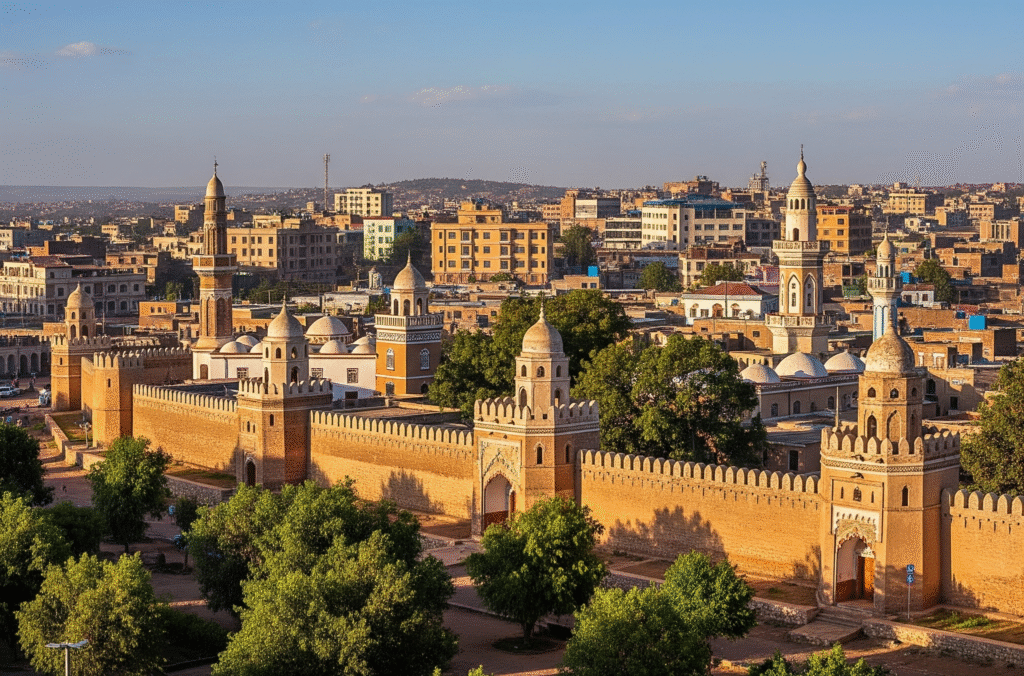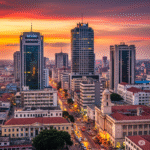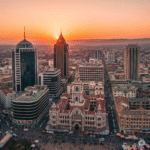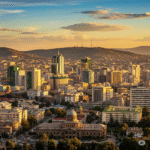
Harar: A Journey Through Time and Tradition in Ethiopia – Travel Guide
Planning Your Trip to Harar, Ethiopia
Country and Region
- Country: Ethiopia
- Region: Harari Region
Time Zone
- GMT+3
Languages Spoken
- Harari
- Amharic
- Oromo
- Arabic
- English (to a limited extent)
Currency
- Ethiopian Birr (ETB)
Weather and Climate in Harar: A Monthly Guide
- January-February: Dry season, with comfortable temperatures around 20-25°C (68-77°F). Ideal for exploring.
- March-May: Warm and dry conditions, with temperatures potentially rising to 25-30°C (77-86°F).
- June-September: Rainy season, bringing cooler temperatures averaging 18-23°C (64-73°F). Expect occasional showers.
- October-December: Another dry season with mild temperatures, similar to January-February (20-25°C or 68-77°F).
Discovering Harar Jugol: A UNESCO World Heritage Site
Harar Jugol, a UNESCO World Heritage Site, is a fascinating walled city in eastern Ethiopia that feels like stepping back in time. This ancient city is celebrated for its unique architecture, the maze of narrow cobblestone streets, and the distinct and vibrant Harari culture. Widely considered the fourth holiest city in Islam, Harar boasts over 82 mosques and 102 shrines, reflecting its profound Islamic heritage. The traditional Harari houses, adorned with intricate designs and striking colors, greatly contribute to the city’s overall charm. Experience the genuine warmth and hospitality of the Harari people and immerse yourself in their rich traditions, including their distinct dress and language, all of which make Harar a truly unforgettable travel experience. It is truly a city of contrasts, where ancient traditions meet modern life. Explore its history, culture and the friendly locals.
When to Visit Harar: Best Time of Year
Seasonal Pros and Cons
- October to February (Dry Season):
- Pros: Pleasant, sunny weather perfect for walking tours and outdoor activities. Ideal temperature for exploring Harar’s history.
- Cons: Peak tourist season, resulting in larger crowds and potentially higher prices for accommodations and tours. Consider booking in advance.
- June to September (Rainy Season):
- Pros: Lush green landscapes create beautiful scenery. Fewer tourists translate to a more intimate experience and possibly lower prices. Enjoy cooler temperatures.
- Cons: Some streets and alleyways may become muddy and challenging to navigate. Expect rain, so pack accordingly.
Getting to Harar: Transportation and Visa Information
How to Get There
- Flights: The closest airport is Dire Dawa International Airport (DIR), which is approximately a one-hour drive from Harar. Ethiopian Airlines provides regular flights from Addis Ababa to Dire Dawa. Check for flight deals online.
- Trains: Currently, there are no train lines that connect to Harar.
- Visa Details: Most nationalities are required to have a visa to enter Ethiopia. You have the option of applying for an e-Visa online before your trip or obtaining a visa through an Ethiopian embassy or consulate.
- Airport Transfers: You can find taxis and arrange for private car services for transfers from Dire Dawa Airport to Harar. Booking your transport in advance is highly recommended for a smoother arrival.
Harar’s Unique Culture: The Hyena Men
Harar is world-renowned for its captivating hyena men. Over generations, families in Harar have cultivated a distinctive relationship with the wild hyenas that inhabit the city’s outskirts. Every night, these “hyena men” feed the hyenas scraps of meat. This unique practice is believed to not only ward off evil spirits but also ensure the safety and well-being of the local community. Witnessing this ritual is both thrilling and slightly eerie, offering a glimpse into Harar’s unique traditions.
Notable People from Harar
Abdullahi Ali Sherif was an eminent politician from Harar, making significant contributions to the region.
Top 10 Things to Do in Harar: Attractions and Activities
- The Jugol Wall
- Description: Explore the historic fortified wall that encircles the old city of Harar. This ancient structure is a key part of Harar’s UNESCO World Heritage status.
- Address: Encircles the entire old city (Jugol), Harar.
- Arthur Rimbaud House Museum
- Description: Visit the former home of the famous French poet Arthur Rimbaud, who lived and worked as a trader in Harar.
- Address: Located in the old city (Jugol), Harar.
- The Harari National Cultural Center
- Description: Immerse yourself in the rich history, unique culture, and vibrant traditions of the Harari people.
- Address: Located in the old city (Jugol), Harar.
- The Jamia Mosque
- Description: Discover one of the oldest and most significant mosques in Harar, a beautiful example of Islamic architecture.
- Address: Located in the old city (Jugol), Harar.
- The Five Gates of Harar
- Description: Explore the five historical entry points that lead into the walled city, each with its own unique history and significance.
- Address: Each gate is situated on a different side of the Jugol wall.
- The Hyena Feeding Ceremony
- Description: Witness the unforgettable nightly ritual where the “hyena men” bravely feed wild hyenas, a unique cultural practice.
- Address: Typically takes place outside the Fallana Gate, Harar.
- The Sheikh Abadir Shrine
- Description: Visit the holy shrine dedicated to Sheikh Abadir, a revered religious figure in Harari history.
- Address: Located in the old city (Jugol), Harar.
- The Christian Church of Medhane Alem
- Description: Discover Harar’s diverse religious heritage at this historic Christian church.
- Address: Located in the old city (Jugol), Harar.
- The Traditional Harari Houses
- Description: Admire the unique residential architecture of the traditional Harari houses, known for their intricate interior designs and vibrant colors.
- Address: Found throughout the old city (Jugol), Harar.
- Erer Gota
- Description: Explore the Erer Gota prehistoric rock shelter, an archeological site showcasing early human history
- Address: Erer Valley
Harar’s Hidden Gems: Off the Beaten Path
- The Community Women’s Craft Center
- Description: Support local women and purchase authentic handmade crafts, such as woven baskets and traditional textiles.
- Address: Located in the old city (Jugol); ask locals for specific directions.
- The Traditional Harari Coffee Ceremony at a Local Home
- Description: Immerse yourself in the local culture by experiencing a traditional Harari coffee ceremony in a local family’s home.
- Address: Arrange this experience through local guides or your guesthouse.
- Exploring the Backstreets of the Jugol
- Description: Get lost in the narrow, winding alleyways of the old city, discovering hidden corners and soaking in the authentic atmosphere.
- Address: Explore freely within the Jugol walls, but be respectful of residents.
Local Festivals and Cultural Events in Harar
- Ashura: An important Islamic holiday commemorating the martyrdom of Imam Hussein.
- Eid al-Fitr and Eid al-Adha: Major Islamic festivals celebrated with prayers, festive meals, and family gatherings.
- Harar Cultural Show: Enjoy a vibrant display of Harari dances, songs, and traditional performances. Check local schedules for dates and times.
Day Trips from Harar: Nearby Attractions
- Dire Dawa: Visit the bustling commercial center of Dire Dawa (approximately a 1-hour drive).
- Babille Elephant Sanctuary: Discover the unique population of elephants at the Babille Elephant Sanctuary (approximately a 2-hour drive).
Photography Hotspots in Harar: Insta-Worthy Locations
- The Jugol Wall at Sunset: Capture the stunning golden light as it illuminates the ancient walls of the city.
- The Colorful Harari Houses: Photograph the vibrant and intricately decorated facades of the traditional homes.
- The Hyena Feeding Ceremony: Document this unique and thrilling cultural experience.
- Panoramic Views from High Points in the City: Capture the breathtaking beauty of Harar from elevated viewpoints.
Where to Stay in Harar: Hotels and Accommodation
Recommended Stay Duration
- 2-3 days is generally sufficient to explore the highlights of Harar.
Top Places to Stay (by Budget)
- Budget-Friendly
- Ras Hotel: Address: Located in the new town, Harar.
- Rewda Guest House: Address: Located in the old city (Jugol), Harar.
- Mid-Range
- Harar City Guest House: Address: Located in the new town, Harar.
- Winta Hotel: Address: Located near the center of town, Harar.
- Luxury
- Luxury hotel options are limited in Harar. Consider booking a well-reviewed mid-range hotel for a comfortable stay.
Getting Around Harar: Transportation Options
- Public Transport: Minibuses are available, but they can often be crowded.
- Taxis: Taxis are readily available throughout the city. Be sure to negotiate the fare before you start your journey.
- Walking: Walking is the best way to fully experience and explore the old city (Jugol).
Preparing for Your Trip to Harar: Packing Tips and Essential Apps
What to Pack
- Comfortable and sturdy walking shoes are essential.
- Lightweight clothing suitable for warm weather.
- Rain gear (jacket, umbrella) if you are traveling during the rainy season.
- Modest clothing to show respect for local customs, especially when visiting religious sites.
- Sunscreen, a hat, and sunglasses to protect yourself from the sun.
Useful Apps for Your Trip
- Google Maps: Great for navigation and finding your way around the city.
- Ethiopian Airlines App: Stay updated on flight information if you are flying into Dire Dawa.
- Translation Apps: Helpful for communicating with locals who may not speak English fluently.
Staying Safe and Respectful in Harar: Local Tips and Cultural Etiquette
- Do: Dress modestly, especially when visiting mosques and other religious sites.
- Do: Always ask for permission before taking photographs of people.
- Don’t: Avoid public displays of affection.
- Don’t: Do not enter mosques or religious sites with your shoes on.
- Safety: Be aware of your surroundings, particularly at night. Avoid walking alone in poorly lit areas.
Harari Cuisine and Culture: Food, Fun, and Finds
Top Restaurants in Harar
- Fresh Touch Restaurant: Offers a diverse menu of Ethiopian and international dishes. Known for its excellent service. Address: Located in the new town, Harar.
- Harari Traditional Restaurant: Immerse yourself in an authentic Harari dining experience. Address: Located in the old city (Jugol), Harar. Ask the locals for specific directions, as it can be a bit hidden.
Must-Try Harari Dishes
- Harari Soup: A flavorful and hearty soup prepared with meat, vegetables, and aromatic spices.
- Ambasha: A delicious traditional Ethiopian bread.
- Qat: A mildly stimulating leaf that is chewed by locals. It’s a social custom, but be mindful of its effects.
Harar Nightlife and Entertainment
- Local Tea Houses: A fantastic place to socialize with locals and enjoy traditional Ethiopian tea and coffee. Address: Found throughout the city.
- Nightlife options are somewhat limited in Harar. Most evening entertainment centers around socializing in local tea houses and cafes.
Souvenirs and Shopping: What to Buy in Harar
- Handwoven Baskets: Purchase intricately designed baskets crafted by local artisans. Address: Available at craft shops in the old city (Jugol).
- Harari Coffee: Buy fresh, locally grown coffee beans – a perfect souvenir for coffee lovers. Address: Available in the markets.
- Traditional Harari Clothing: Find colorful textiles and garments that showcase the unique Harari style. Address: Available in the markets.




